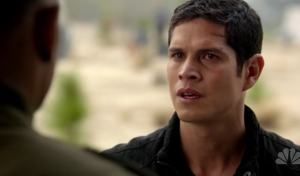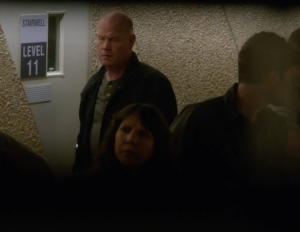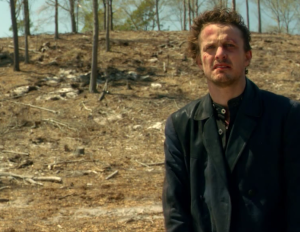“Curse your sudden but inevitable betrayal!”
The line made popular by Wash from Firefly‘s follow up film Serenity back in 2002 was reiterated multiple times, by many people, during and after the season finale of Revolution, “The Dark Tower.” Season one leaves a variety of sentiments lingering on our tongues, not the least of which concerns who we are to root for in the season that awaits us this fall. Jason put it best when he said to his father: “Sorry, it’s just that my head is spinning from how quickly you switched sides.”
There’s a change in the winds, says I.
As adventure television often goes, the finale was not necessarily a 42-minute installment through and through. The penultimate episode was just as critical to the events that occurred in the finale as the finale was itself because it established the conflicts each party would face as they stretched to accomplish their goals. But each stage along the way, since the series premiere, has been critical in shaping these characters for the choices they would ultimately make to determine when, if, and how the power is turned on.
A YEAR IN REVIEW
Before getting into the episode, I just want to briefly refresh our minds. The following is a list of the major players in Revolution and a brief arc of their evolution from beginning to end:
- Charlotte “Charlie” Matheson: immature townie -> nuisance/fire under Miles -> along for the ride
- Danny Matheson: kidnapped teen -> recovered brother -> dead
- Aaron Pittman: Google programming exec (fish out of water) -> protective uncle & stubbornly persistent traveler -> backbone to the Tower enterprise
- Miles Matheson: failed assassin & a drunk -> reluctant and highly flawed hero -> re-directing his moral compass
- Sebastian “Bass” Monroe: Oz the Great and Powerful -> Tyrannical maniac -> General without an army
- Rachel Matheson: Monroe POW -> possessor of many secrets -> POWER ON orchestrator
- Nora Clayton: Rebel agent -> bomb aficionado -> dead
- Tom Neville: Major in Monroe Militia -> fugitive-turned-Georgia-Federation-operative -> usurper and new leader of the Monroe Militia
- Jason Neville: Nate -> father defier & conscience follower -> reluctant lieutenant & Charlie defender
- Randall Flynn: Grace’s abductor -> the man with all the answers about the power -> launcher of missiles -> dead
I don’t know what you noticed about this list, or if you even agree with me, but what I first noticed was how much the roles of each character changed throughout, most increasing and decreasing in importance week-to-week. Charlie was so central to efforts at the beginning of the season because she was the one who motivated and spurred Miles, Aaron, and even Nora, on to rescuing Danny. But through the natural course of events, that spotlight shifted and she undertook a much more secondary role. Aaron’s evolution has been the most fascinating to me, in part because of the brief history we learn of his experiences with his wife in the early aftermath of the power going out. The backbone he developed has made him lovable. And not in an “oh, I want to pinch your cheek!” kind of way, more like: “Yeah! This guy knows who he is now!”
LEVEL 12
Joke all you want about 4 8 15 16 32 42 or “moving the island”, when JJ Abrams is part of an adventure, there will be references to LOST. But the enigma of Level 12 is pretty self-contained. The purpose of it is not wrapped in some cosmic, supernatural force. It has a design, a function, a rhythm, a discernible infrastructure. And finally getting to see the Tower’s massive server room helped to define the scope of this show. In a very good way.
By no means am I saying that a deeper dive into science fiction is contrived, clearly they’ve taken the right strides to legitimately present nanites as a man-made, unintentional antagonist. After a season, however, there is an element of consistency to the type of science fiction this show utilizes, and what we’ve seen so far is pretty much contained within the ability to control (or maybe, not control) the nanites. I’m open to concepts like time travel being introduced, but from what we’ve seen there is no evidence that we are heading down that path, though opportunities to make it work within the story have been presented. But those opportunities are merely thematic, not logistic. There have been no time lapses, no amnesia, no random disappearances. No technology, no discussion, no scientific reasoning. I’m saying this because I like how Kripke has managed to make this incredibly intricate story, filled with loss and betrayal caused by too many bodies in the kitchen, centered around a singular science fictional concept.
Many science fiction shows like to explore as many angles as they can of “the impossible” which all feed in to the enigmatic and mysterious Big Bad of the season or series. The Big Bad then has many possible origins and tools to utilize as potential weapons against the central characters. But with Revolution, the focus is pretty narrow and as a whole spends more time blurring the lines between good and bad than attempting to develop a “monster of the week” concept, if you will. The dichotomy between literal and authoritative power has existed from the onset of episode one, but since then the focus constantly fluctuates between the literal power (electricity/the Tower) and the battle for authoritative power until we assume it’s all wrapped into one (“He who has the gold makes the rules.”). Au contraire, mon frère.
In a feedback I gave several weeks ago, I noted how absurd it was for Monroe to think that he can sweep across the nation and conquer the land, and then expect all of those he had conquered to just simply submit to his authority, especially by a people who used to live in the Land of the Free. Monroe can implement his own tactics when he’s no longer subjected to an authority like the U.S. Government, but that doesn’t change another person’s philosophy on life. I actually think Monroe had a greater chance of obtaining full supremacy before he got the pendants and began using air strikes against the rebels. What he had to lose, and the depth at which he could lose it, was far less significant pre-pendant. It follows the principle of “the more you get, the more you want.” Killing those who betrayed him turned him maniacal and paranoid, but in order to sustain that facade he had to keep on smiting those who even looked at him crossly.
The nanites weren’t just shut down for Monroe’s enemies. Everyone gets power back. Turning the power on has implications that have yet to be full explored. We saw some of the immediate effects: reactions from President Foster, from the weather, from the President in Cuba. But going back to the literal versus authoritative power, when the power was turned off, there were necessary shifts in authoritative power to accommodate the new electricity-free world. So naturally, as the power is turned back on, authoritative power must, once again, be adjusted to suit the climate. And this new climate will be as fresh and new as it was 15 years ago. How will relations resume with foreign entities? What shape will each district, federation, or independent state take in maintaining order? Managing, producing, controlling, and billing for power will be as intriguing factors as political reformations.
And just because the nanites have been shut down doesn’t mean they pose any less of a threat. Will a new disease, which the nanites have been suppressing, break out? How many people, like Dr. Warren’s partner Beth, will drop dead in the hours, weeks, months following the nanites deactivation? Grace’s comment in the opening minutes of the episode were most intriguing: “We still don’t know what went wrong the first time.” Either I missed what was unexpected, or we are just to assume that the nanites replicated out of control and burrowed their little bodies into much more than was anticipated. Or perhaps the power going out all over the world was unexpected, maybe they intended it to be localized (like a bomb). Following Aaron’s comment about the backdoor being opened, it makes me wonder whether Randall’s command to activate the Tower 15 years ago was not what turned the power off in the first place.
A CHANGE IN MANAGEMENT
“That’s the difference between you and me. You frighten, I inspire.” – Tom Neville
More than once this episode I found myself comparing Neville to Jack Sparrow. Remember in At World’s End when one of Lord Beckett’s officers says: “Do you think he plans it all out, or just makes it up as he goes along?” That’s kind of how I feel about Neville. He’s an opportunist, and one of the most dangerous kind. He’s quick, adaptable, influential, and untrusting. As quickly as I despised Tom Neville’s character at the beginning of the season, for his brutality, for killing Ben, for kidnapping Danny, I have just as quickly become fascinated by him. I don’t think he inspires, as he cannot even get his own son on board with his varying loyalties, but his ability to grab hold of opportunities and use them to his advantage makes it appear as though he is inspirational. But he’s talking to Monroe with his ego. Jack Sparrow is the same way. He’s on everyone’s side at the same time, and then also on no one’s side; he’ll do or steal anything to stay alive. Actually, he’ll do or say anything to save or obtain the Black Pearl, for which he is always in pursuit. In At World’s End, Jack votes to make Elizabeth Swann the Pirate King not because he thinks she will be a worthy candidate, but because his needs happen to fall within the scope of what she intends to do with her power.
In many ways, Jack is the most powerful pirate because of his ability to be so chameleon-like; and Tom Neville is equally as powerful because he doesn’t just jump sides when he sees fit, he builds a forcefield around himself. As a major (pain) in Monroe’s army, his men followed him because it was better to conform than to stand against him. When he fled to Georgia, it was President Foster’s desire to have a former Monroe soldier in her ranks that kept Miles from killing him on the spot. And now, as he takes over Monroe’s army, it was his ability to turn the oppressed and Monroe-fearing soldiers against their General that gave him the footing to cleanly sweep the army out from under Monroe.
FAMILY. BROTHERS.
From the many interviews of Eric Kripke, JJ Abrams, and Jon Favreau, we’ve gotten a clear indication that Abrams’ involvement has been fairly minor. He is credited as co-creator, which I believe is quite true, but die hard fans of Kripke will say that it is much more Kripke than it is Abrams. And that is fine by me. I love JJ Abrams, don’t get me wrong, but there are so many great story tellers out there and Abrams is spreading himself out, giving them all an opportunity to be successful. I’ve seen a smattering of Supernatural season one episodes (a Kripke show) and in many ways they remind me of what we see here in Revolution. However, there is a much different story going on in Revolution and the ways we see Kripke manifest in the characters is very different.
Kripke’s “thing” is family. And strong familial bonds are exuded throughout Revolution‘s first season, but they’re represented most strongly in the form of adoption. Charlie is very close with her brother and father, but they are both dead by midseason. In her adventures, she adopts a new family, her Uncle Miles, Nora and Aaron among those she cares for. I think one of the strongest sentiments this show has is depicting how terribly things can go wrong and then showing the fallout from that. How do a variety of personalities handle what is thrown their way when a wrong choice is made? Aaron, thinking he did the right thing by leaving his wife, lives believing that his wife lived a better life without him. What a terrible way to live!
And Rachel, whose sordid past with Miles we still don’t fully know, found it more important to surrender herself to the Monroe militia than to be with her husband and children. Again, we don’t know the full story, but that is kind of the point. We don’t ever know the full story. This show isn’t shy in giving us answers, so once it’s relevant, it will be revealed. Favreau said at the 2013 PaleyFest that in the course of writing a character, if they have absolutely no good reason not to reveal something, then the truth needs to come out. But Rachel abandoned Charlie as a child, left her with Miles to go after the Tower, and finally, when Nora is bleeding out, cares more about vengeance for Danny than saving Nora. Can you blame Charlie for caring more about Nora than her mom’s objective?
The strongest “adoptive” family I’m referring to is the Bass/Miles relationship. When we found Miles running a bar and trying to drink himself to death back in the pilot, he had failed in his efforts to assassinate his best friend, who happened to lead the militia of which he once was a General himself. As the season unravels we’re met with person after person who was wronged by Miles, either through the training he gave them to be a ruthless killing machine, or in some other unfavorable way (though from Foster’s little tirade we can infer a couple things). It seemed like every week there was someone new. This goes back to what I was saying before. We don’t know exactly what drove Miles to become the person who trained these people, we don’t know what changed in him to sympathize with innocent victims of Monroe’s vendetta in the aftermath of the bomb that nearly killed Miles.
But of all the men Miles trained, of all the people he wronged, Monroe was the most deeply affected because he was with him at each stage along the way. His “borderline erotic fixation” on Miles was the source of his derangement, which began long before Miles tried to kill him. As boys they had feuds, as teens they loved the same girl, as adults they fought in the war. These men were closer than brothers, and Monroe had all that time to develop various fixations on Miles. Obsessively. Monroe is like the younger brother following Miles around, matching all his feats, doing all his dirty work, constantly vying for attention.
Maybe Miles woke up from the bombing, as we saw in the flashback, and felt sick about the man he became. Maybe Monroe’s actions disgusted him because he felt them himself and hated him for it. Maybe his assassination attempt on Monroe was just as much to end the disgust in himself as it was to snuff it out in someone else. But as Monroe, how do you handle that? How do you reconcile a lifetime of brotherhood with the figure of your best friend hovering over your bed, ready to kill you? When Monroe said, “I never even saw it coming.” I could see it all. I could empathize. Not, of course, with the current circumstances, but in understanding the confusion of his friend’s betrayal and feeling a hatred that ran so deep simply because there was so much history between them to hate on.
WRAPPPP UP
Television is an odd way of telling a story. Brilliant, in its own right, but odd. We only ever join to fray when things get interesting. We don’t spend an hour each week watching the characters eat each meal, wash their clothes, or shave. Inferences are made, transitional inferences, to carry us from scene to scene. If it were any other way, serial dramas wouldn’t be nearly as popular as they are. Characters are emphatically dramatic, ballooned instances of their counterparts in real life, in order to convey multiple messages to a broad television audience. They are real and not real all at once. We see ourselves in them one week, and the next week we hardly recognize them.
So if it’s not real enough for you, the Bachelorette is on Mondays at 7/8C on ABC. There’s some drama for you.




Nice post miss Emilee! I kinda like the idea of the nanites giving people enhanced abilities and/or weaknesses. The Evolution subtext is in the title sequence. I don’t want them to go into Heroes territory mind you but it’d be fun to see the ways humans will be changed.
I’d also like some decent stand alone (aka monsters of the week type) episodes. This would allow deeper character development and reduce the reliance on battle scenes and yet keep an over arching mythology moving along.
The show will only survive if it has an understandable and detailed world built to move relatable characters around in.
Namaste,
Bonita